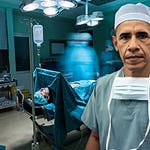Klaus Schwab, the self-anointed potentate architect of globalism, has finally been toppled from his perch at the World Economic Forum (WEF), resigning in disgrace on Easter Sunday 2025. The 87-year-old’s abrupt exit, cloaked in a flimsy excuse about his age, was no voluntary retirement—it was a forced retreat driven by a damning whistleblower report exposing alleged corruption and the gross hypocrisy at the heart of the WEF’s elitist empire. This isn’t just the end of Schwab’s reign; it’s a crack in the facade of the globalist agenda that’s been fleecing nations and subjugating freedoms for decades.
The whistleblower report reads like a sordid tale of entitlement. Schwab, the man who preached “stakeholder capitalism” to the masses, is charged with treating the WEF’s coffers as his personal piggy bank, instructing subordinates to pull thousands from ATMs for his whims and billing the Forum for private, in-room massages at luxury hotels. His wife, Hilde, a former WEF employee, reportedly joined in the embezzlement, scheduling sham “meetings” to justify extravagant holiday jaunts on the Forum’s dime. This is the hypocrisy of globalism laid bare: while Schwab’s WEF lectures the world on “sustainability” and “equity,” its leader lived like a modern-day monarch, above accountability.
But the allegations don’t stop at financial impropriety. The report paints Schwab as a workplace tyrant, fostering a culture where sexual harassment and discrimination against female employees went unchecked. The WEF’s prior investigations into these claims—conveniently dismissed by its own leadership—reek of a cover-up. Schwab’s request to the WEF Board of Trustees to ignore the whistleblower report only underscores his arrogance, but the board, perhaps sensing the growing global backlash, defied him and launched an independent probe. This move, while late, signals that even the WEF’s inner circle can no longer ignore the stench of scandal surrounding its founder and the globalist hypocrites at the top.
The WEF’s turmoil isn’t just about Schwab’s personal failings—it’s a symptom of a broader reckoning with globalism itself.
For years, the Forum has peddled a vision that empowers unelected elites while eroding national sovereignty and personal liberty. Schwab’s 2020 manifesto, COVID-19: The Great Reset, was a chilling blueprint for this agenda, exploiting a global crisis to push for a restructured world order that prioritizes centralized control over individual freedom and national sovereignty. From the Paris Climate Accord’s economy-crippling regulations to the divisive dogma of diversity, equity, and inclusion (DEI), the WEF’s policies have consistently favored globalist ideals over the needs of ordinary people. Critics, including Heritage Foundation President Kevin Roberts, have rightly called out the Forum’s absurd claims—that climate change is humanity’s greatest threat, that illegal immigration is a net positive, or that American cities are safe havens despite rising crime.
This globalist hubris was on full display at the WEF’s 2025 Davos meeting, where newly inaugurated President Donald Trump delivered a scathing rebuke.
In a speech that electrified the room, Trump touted his withdrawal from the Paris Climate Accord and his dismantling of “discriminatory DEI nonsense,” framing his administration’s actions as a “revolution of common sense” against the WEF’s ideological excesses. His words weren’t just a policy critique—they were a direct challenge to the Davos elite, who’ve long treated nations as pawns in their grand utopian schemes. Trump’s defiance resonates with a growing global movement rejecting the WEF’s top-down control.
The WEF’s influence has long been bolstered by dubious figures like George Soros, the billionaire globalist recently awarded the Presidential Medal of Freedom by outgoing President Joe Biden. Soros-funded groups, as detailed in the book The Woketopus: The Dark Money Cabal Manipulating the Federal Government, owned Biden’s administration and both the Obama and Clinton administrations, steering them toward policies that echoed the WEF’s agenda. From green energy mandates that spiked energy costs to open-border policies that strained public resources, the Biden-Obama-Clinton-Soros nexus exemplified the globalist playbook: prioritize ideology over practicality, and let the average citizen bear the cost.
Schwab’s resignation, while a symbolic victory for critics, doesn’t dismantle the WEF’s machinery overnight. The Forum’s leadership shake-up, prompted by a prior probe into its toxic workplace culture, shows an organization scrambling to save face. CEO Børge Brende’s claim that earlier allegations against Schwab were unsubstantiated only deepens skepticism about the WEF’s integrity. The independent probe into the whistleblower report, while necessary, risks becoming a performative gesture unless it exposes the full extent of the Forum’s mismanagement and ideological overreach.
The broader fight against globalism demands more than ousting one figurehead. As the Heritage Foundation’s Roberts declared at Davos in 2024, conservatives must reject every WEF proposal wholesale, from its climate alarmism to its borderless fantasies. The WEF’s vision—where unelected bureaucrats dictate economic and social policy—clashes with the principles of self-governance and accountability. Roberts’ call to return power to the American people, just as we are hearing from leaders of movements advocating sovereignty around the free world, isn’t just a conservative rallying cry; it’s a universal demand for liberty against the creeping authoritarianism of globalist institutions.
Schwab’s fall is a cautionary tale of what happens when unchecked power festers behind a facade of moral superiority. The WEF, under his stewardship, became a caricature of elitism, preaching “resilience” and “inclusion” while indulging in excess and discrimination. As the probe unfolds, the world will watch to see if the Forum can reform itself or if it will double down on its discredited agenda, and whether its actions are enough to stem the call for its dismantling altogether. For now, Schwab’s resignation is a crack in the globalist edifice—a reminder that no one, not even the self-styled pseudo-savior of the world, is above scrutiny.
The backlash against the WEF is more than a moment; it’s a movement. From Trump’s America to populist uprisings across Europe and Latin America, people are rejecting the Davos dogma that has enriched elites while impoverishing freedom. The task ahead is clear: dismantle the globalist frameworks that prioritize control over prosperity, and restore power to nations and their citizens.
Schwab’s exit is a start, but the real work lies in ensuring the WEF’s vision of a “great reset” remains a failed dream, consigned to the ash heap of history.
The End Of Dick Durbin &
The Urgent Need for Illinois Conservatism
For nearly three decades, US Senator Dick Durbin (D-IL) has sat in the Senate, a fixture of Illinois’ Democrat machine, wielding influence that has steadily chipped away at the sovereignty, freedom, and individual rights of Americans. As the Democrat Whip and a loyal servant of Chicago’s progressive elite, Durbin’s tenure is a case study in governmental overreach, urban dominance, and the betrayal of Illinois’ heartland values.
Durbin’s policies have empowered the Deep State bureaucracy, undermined personal liberties, and entrenched the Illinois Democrat Party’s stranglehold on a state that was once a bastion of conservative principles in the 1980s and 1990s. Worse, as Durbin has announced he will not seek re-election in 2026, the prospect of his replacement—likely another Chicago-machine-backed, smoky backroom-supported neo-Marxist—threatens to deepen this erosion.
Illinois, a state that must re-embrace its conservative roots, faces a critical juncture to reject the cancer of urban encroachment and restore its statewide sovereignty.
Durbin’s record is a litany of assaults on individual freedom. His relentless push for the DREAM Act since 2001, and his advocacy for DACA, prioritizes illegal immigrants over American citizens, undermining national sovereignty by incentivizing unchecked migration. Critics have called this a “masterclass in bureaucratic overreach,” arguing it diverts resources from hardworking Illinoisans to those who bypass legal pathways.
Durbin’s support for the Affordable Care Act’s expansion, another federal overstep, has ballooned costs and forced citizens into a broken healthcare system, eroding personal choice under the guise of compassion. His sponsorship of the Combating Online Infringement & Counterfeits Act and the PROTECT IP Act in 2010 and 2011, respectively, sparked outrage among digital rights activists, who warned of censorship and First Amendment violations. The Electronic Frontier Foundation condemned these bills for enabling government overreach into online speech, a direct threat to individual liberty.
As Senate Judiciary Committee chair from 2021 to 2025, Durbin’s leadership facilitated far-Left progressive judicial appointments that further tilted the federal bench toward activist interpretations of the law, undermining the constitutional protections of property rights and free expression.
His initial anti-abortion stance in the 1980s, which aligned with Illinois’ then conservative leanings, gave way to a full-throated embrace of abortion rights, reflecting not principle but political expediency. This flip-flop, justified by the lame excuse of “personal reflection,” mirrors his broader shift from representing Illinois’ rural heartland to serving Chicago’s urban elite. The National Journal once ranked him the Senate’s most liberal member, and GovTracks.us ranked him the 13th most liberal member of the US Senate in 2024, a far cry from the moderate image he cultivated early in his career to get elected.
Since the turn of the millennium, Illinois’ political landscape has been warped by far-Left Chicago Democrats, who have turned a state with a proud conservative history into a neo-Marxist progressive fiefdom.
Before the progressive onslaught, Illinois elected Republican senators like Charles Percy and Mark Kirk, reflecting a “red state” ethos that valued limited government and individual responsibility. Today, the Illinois Democrat Party, controlled by Chicago’s smoky backroom machine, suffocates the state’s rural and suburban voices. Urban encroachment—with Chicago’s progressive policies, crime, and cultural dominance spilling into once-conservative suburbs—has diluted the values of communities like Naperville, Hinsdale, Oak Brook, Schaumburg, and Downers Grove, not to mention formerly solid red counties like DuPage, Will, and Lake. This cancer of urban spillover, facilitated by Durbin’s policies, imposed high taxes, regulatory burdens, and social engineering on suburbs that once thrived as conservative strongholds.
Durbin’s departure could usher in a successor even more radical and more opposed to individual freedom. Potential replacements like Lt. Gov. Juliana Stratton or Reps. Raja Krishnamoorthi, Lauren Underwood, Robin Kelly or, God forbid, former Chicago mayor Rahm Emanuel—all tied to Chicago’s corrupt Democrat machine—promise to double down on far-Left agendas. Krishnamoorthi, with $13.5 million in campaign funds, could leverage urban wealth to drown out downstate voices. Underwood’s progressive posturing, including her vote against condemning support for terrorist groups, signals a willingness to prioritize ideology over principle.
A WBEZ report noted Durbin’s influence gave Illinois outsized federal clout; his successor, likely another far-Left urban-backed Democrat, could wield that power to further erode state sovereignty by pushing for federalized healthcare, gun control, or climate mandates that clash with Illinois’ rural values.
Illinois must reject this trajectory to the globalist Left and return to its conservative roots. The state’s conservative resurgence in the 1980s and 1990s, driven by figures such as Gov. Jim Edgar and Illinois Senate President James ‘Pate' Philip, demonstrated that limited government, fiscal responsibility, and respect for individual rights resonate with voters. A Republican like US Rep. Darin LaHood (R-IL), noted for his center-Right appeal and Peoria roots, could challenge the Democrat machine by focusing on economic freedom and border security, issues that resonate in Illinois’ suburbs and rural counties.
The Cook County Democrat Party’s pre-slating meetings in April 2026 will likely anoint a Chicago loyalist, but a conservative groundswell would stand a good chance of disrupting this coronation.
The stakes are high. Durbin’s legacy—government overreach, urban spillover into the suburbs, eroded freedoms, and exploding crime—threatens to metastasize under a successor beholden to Chicago’s elites. Illinois, once a red state, must reclaim its conservative soul to protect its sovereignty and restore the individual rights of its citizens.
The 2026 election is a battle for the state’s future and a chance to reject the cancer of urban encroachment and to rebuild a free, prosperous Illinois.


















